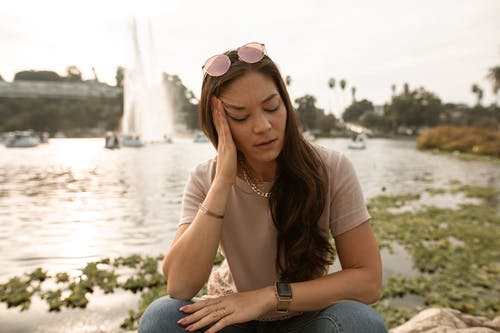
Blog Layout
Anxiety-The Impact on Mental and Physical Health
Margaret Denise Brauns, LMFT
Are you aware how much anxiety impacts your life?
Anxiety can be the underlying cause for hundreds of physical symptoms. Often individuals believe they have a serious medical condition long before they realize they have an anxiety disorder. Many clients, specifically adults, deny having anxiety but will readily admit that they worry constantly. It is estimated that nearly 70% of Americans suffer from at least one type of anxiety.
Chronic or severe anxiety can be disabling; a roller coaster of emotional and physical symptoms drastically impacting the quality of one’s life. Following is a list of commonly reported physical and emotional symptoms reported by individuals who suffer from anxiety. Frequently patients are relieved to hear or read that others have similar experiences or thoughts such as "anxiety about anxiety" or fearing another panic attack. As unique as we are individually, so is the severity and type of symptoms one may experience as a result of anxiety.
Following are commonly reported physical symptoms, thoughts and fears
associated with anxiety.
Physical symptoms associated with anxiety:
• Body and muscle aches
• Extreme sensations of being hot or cold
• Chest pain and tightness
• Startling easily
• Dizziness or lightheaded
• Weight loss or weight gain
• Body or Head Zaps, tingling sensations or numbness
• Restlessness or inability to relax
• Weakness/weakened muscles
• Flu-like symptoms, feeling as if coming down with a flu
• Frequent urination
• Profuse Sweating
• Sensation of choking or suffocation
• Gagging, coughing
• Heart palpitations, pounding or racing heart
• TMJ or tightening of the jaw
• Shooting pains in any area of the body
• Holding one’s breath, shortness of breath or rapid breathing
• Increased or decreased sex drive
• Difficulty hearing, “plugged” or ringing in the ears
• Nausea and vomiting
• Neck, back, or shoulder pain, tension, tightness/stiffness
• Night sweats, waking up in a sweat
• Vertigo or feeling off balance
• Trembling or shaking
• Headaches and migraines
• IBS
Impact on Sleep
• Insomnia-Difficulty falling or staying asleep
• Frightening or bizarre dreams
• Hearing sounds that jolt one awake
• Waking up in a panic attack
• Experiencing heightened anxiety in the mornings
Fears Associated with Anxiety
• Excessive fear of what others think
• Afraid of being trapped with no exits
• Fear of dying
• Fear of losing control or snapping
• Fear of panic attacks
• Fear about health or having an undetected health condition
• Fear of making mistakes or feeling humiliated
• Fear of being in public places
• Fear of fainting
• Fear of going insane or losing a sense of reality
• Fear of uncontrollably harming oneself
• Fear of being alone
• Fear of germs, infection or contamination
Thoughts Associated with Anxiety
• Difficulty focusing or concentrating
• Feeling that one is in a non-reality
• Brain fog or Deja Vu
• Depersonalization
• Feeling disorientated
• Constant feeling of overwhelm
• Obsession about physical health or sensations
• Repetitive thinking/rumination
• Desensitization
• Difficulty with short term memory or learning
• Crying for no apparent reason
• Not caring about things once important
• Feeling detached from loved ones or emotionally numb
• Irritability
• Depression
• Mood swings
Getting Support
Living with chronic anxiety can lead to feeling desperate and hopeless about one’s life. Misunderstanding anxiety disorders or lacking knowledge about mental health treatment, stress and triggers prevents many from seeking the help they need. Enduring an anxiety disorder without treatment can prolong daily suffering. Research indicates that the most effective treatment plan for chronic anxiety is a combination of Psychotherapy and help from a medical professional. Medication may help with physical symptoms and/or a chemical imbalance; mental health professionals can assist with strategies to change faulty thinking patterns, reduce stress, and identify triggers that contribute to anxiety disorders.
Today is great day to seek the support you need.
Today is great day to seek the support you need.

By Margaret Denise Brauns, MS, LMFT
•
March 21, 2021
Anxiety is often the underlying cause of physical symptoms mistaken for other health conditions. We frequently believe we have a serious medical condition long before we recognize we have anxiety, or even consider an anxiety disorder. It is not uncommon for clients, specifically adults, to deny having anxiety but readily admit to worrying constantly. A recent study from the National Institute of Mental Health revealed that nearly 70% of Americans suffer from at least one type of anxiety disorder. This report should be of no surprise: we live in a culture where chronic stress is an accepted part of daily life. At early ages, we are indoctrinated with suggestive messages that busy is healthy, we must perform faster, accomplish more, and demonstrate success by perfection-based ideology. Having been conditioned to believe that more is better, we frequently add too many things to our plates. We have difficulty setting boundaries and saying no. Many believe they thrive when busy and even express a sense of pride when discussing a relentless schedule. The inevitable outcome of a life packed full with every minute accounted for, is overwhelm, burnout, and chronic anxiety. In my experience, clients easily express a desire to feel less overwhelmed and have more leisure time. However, when asked to let go of unnecessary commitments, there is resistance. Inevitably, after living with chronic stress for long periods of time, the norm may be feeling anxious. A change that creates open time and space, can create a " time void " that is uncomfortable. In fact, letting go of anxiety or stressors can actually be anxiety- provoking. To combat chronic anxiety, clients must commit to reducing stress, as opposed to “managing stress”. Stress in life is unavoidable and it is true that some individuals have less stressful lives due to advantageous personal circumstances. Regardless, of our circumstances, it remains common to accept unmanageable workloads, entertain stressful relationships and continue adding activities to full schedules. For change to occur, we must let go of habits that leave us mentally and physically depleted. You can choose to fill the "time void" with self-care which may include rest. Americans have learned to accept chronic anxiety as a way of life, even knowing of the negative implications on our health and relationships. Health experts have concluded that chronic stress reduces our life span by an average of 6 years. The goal in my office is stress reduction. If your life feels overwhelming and unmanageable, you must make choices to change it. Trying to manage the unmanageable is a losing battle. Pay attention to how often you hear or use the term stress management. Identify activities you don't need to do such as attending a social function where you know few people or cleaning an already tidy house. Learn to put your health first by prioritizing time for rest and recharging. The elimination of unnecessary stressors and reduction of chronic anxiety will increase your lifespan and improve the quality of your life. The number of stressors you have is generally a choice. How you respond to stressful events is also a choice. Learn how to eliminate stress and reduce anxiety. You can respond to life in ways that create opportunities for living the life you want.

By Margaret Denise Brauns, MS, LMFT
•
March 20, 2021
Benefits of Journaling Journaling has regained popularity in recent years in mental health. It has once again become a tool for a variety of mental health conditions including anxiety, depression and reducing stress. Whether you are in therapy or on a path of self-discovery, writing your thoughts and experience is is valuable. Research has proven that strategic, committed journaling can actually change the way one thinks, feels and behaves. Studies reveal that individuals who commit to 30 days of writing daily in a gratitude journal, report significant improvement in their positive outlook on life. An additional benefit is that success in journaling is not impacted by financial circumstances, education, age, or writing skills. Journaling only requires a desire and commitment to the process. While there are technically no wrong or right ways to journal, there are strategies to help get you motivated to begin. Ask yourself about the value you see in journaling and if you can to commit to the process. Discuss lack of motivation or resistance with your therapist or someone who successfully journals. Try following general guidelines to help get you started or research journaling prompts. Tips for Journaling: Buy or find a journal you’d like to use. Keep it in a secure but accessible place. Commit to writing every day for 30 days. Keep going if you enjoy it! Set a consistent time aside each day for journaling. It doesn’t need to take 1 hour; start with a 5-minute commitment. Once you begin writing, keep your momentum going. Write anything that comes to mind… Write honestly. While journaling is a creative form of writing, in order to gain self-awareness, it is not intended to be fictional. Accept that journaling is not about using correct grammar or perfect writing skills. Allow yourself to be spontaneous. Be confident that no one is going to read your journal. (If you believe there are boundary issues in your home, learn how to set boundaries. Keep your journal at work or in a locker at school if you must.) If you feel blocked in writing, use prompts from journaling books or websites. Try gratitude journaling, or focus on journaling about something of interest to you. (i.e. parenting, relationships, childhood memories). Do not critique or judge your own writing. The key is honesty and spontaneity. Make sure you are not censoring your writing. Ask yourself if you are writing what you think should do or feel or if it is what you really feel, what really happened or what you wish happened? Look forward to the self-discovery in your writing. Even facing hard truths leads to a more peaceful way of living. Do not be stingy with yourself about journals if possible. Buy a cover you enjoy and replace journals frequently. When you are ready to start a new journal, do it. Some people ceremoniously burn or destroy journals when complete. Develop your own traditions with journaling. Have fun with it and enjoy the process. Just get started. The longer you journal, the sooner you will develop a routine and style that works for you. Allow yourself to discover your truth through journaling. It is an excellent tool in the process of self-awareness and change. Self-awareness can help you understand your emotions and behaviors and can create opportunities for change. Journaling is easy, inexpensive, and well worth the effort. Today is a great day to begin journaling.

By Margaret Denise Brauns, MS, LMFT
•
March 19, 2021
Relationships suffer with unresolved conflict. Even strong relationships become vulnerable when problems occur and no resolution is in sight. Unresolved conflict that becomes circular, hostile and resentful can chip away at the foundation of any relationship. Learning the art of apologizing and forgiveness is critical in relationships. We all have days when we are not our best self and we make mistakes or poor choices. "To error is to be human". When our words, decisions, or mistakes hurt others, intentionally or not, we must learn to apologize. Resolving conflict with grace brings us closer together: unresolved conflict can break down any relationship. Apologizing can be difficult; it is natural to feel justified in action or not want to accept responsibility for mistakes. Barriers to apologizing include disagreement about the problem, or the fear of admitting we are wrong. Feeling vulnerable when we apologize is common. It is most important to understand that we can increase intimacy and strengthen our relationships by learning to apologize. Apologizing can be this simple: 1) State with sincerity that you are sorry 2) Identify what you can do better 3) State your intention to respond differently in the future. 4) Be willing to listen to feedback without defending your actions. 5) Accept that forgiveness may take a little time. Forgiveness is Underrated While apologizing can be hard, forgiving others when we feel wronged can be even more difficult. Once you have received a sincere apology, it is a choice how to proceed. Forgive the offense or harbor resentment? Choose to trust the sincerity or make exit plans? Holding onto resentments or past events will eventually lead to the unraveling of relationships. Practice forgiving even when it is difficult. Forgiving can leave us feeling vulnerable: we are fearful that we may be hurt again. Learn the skills to apologize and the skills to forgive. Forgiveness of others is a true statement of love. In forgiveness we are saying, I love and value you even though we are both imperfect. When we forgive others, we are able to free ourselves of anger and negativity that hurts us. We are also able to reopen the door to communication and intimacy in our important relationships. “Forgiveness is the truest form of love. It takes a strong person to apologize and even a stronger person to forgive." Today is a great day to learn how to apologize and how to forgive.
Get my posts directly to your inbox
Contact Us
Thank you for contacting us.
We will get back to you as soon as possible.
We will get back to you as soon as possible.
Oops, there was an error sending your message.
Please try again later.
Please try again later.
Serving El Dorado, Placer & Sacramento County including: El Dorado Hills, Cameron Park, Shingle Springs, Folsom, Roseville & Placerville
Communities.
Telehealth & In-Person Appointments Available
Margaret Denise Brauns, LMFT
(916) 316-7662
foothillsfamilycounselingedh@gmail.com
895 Embarcadero Drive, Suite 209,
El Dorado Hills, CA 95762
